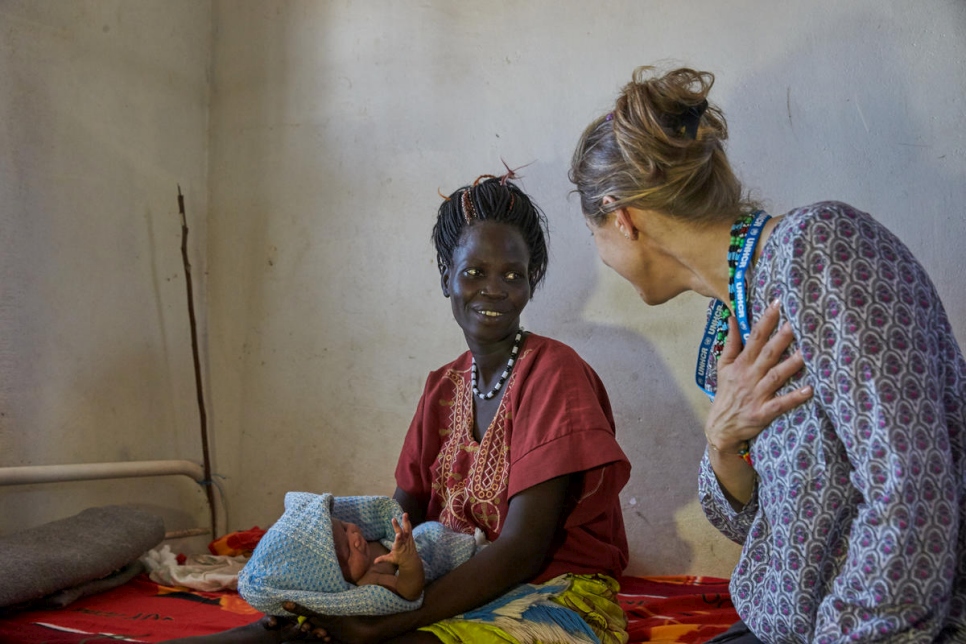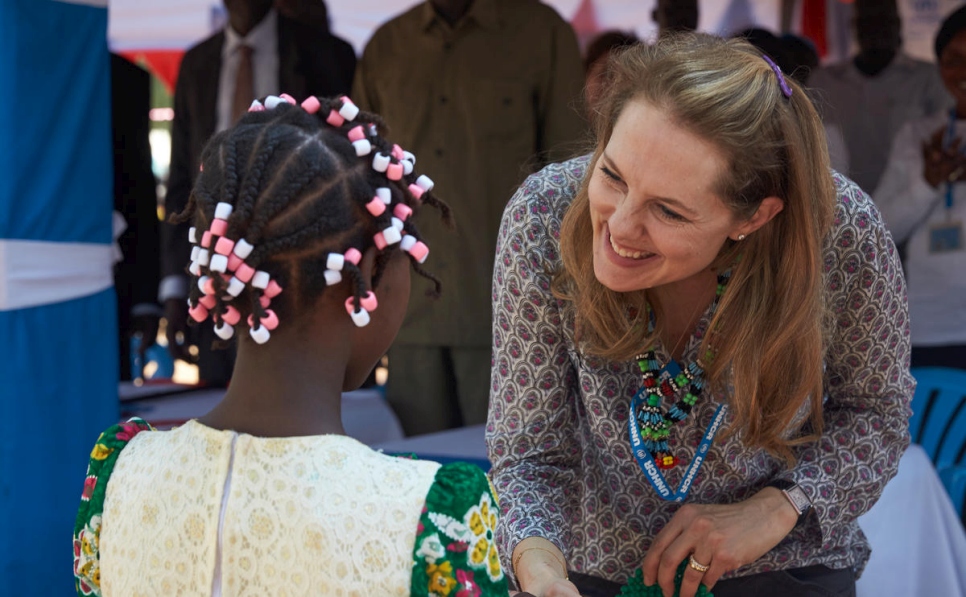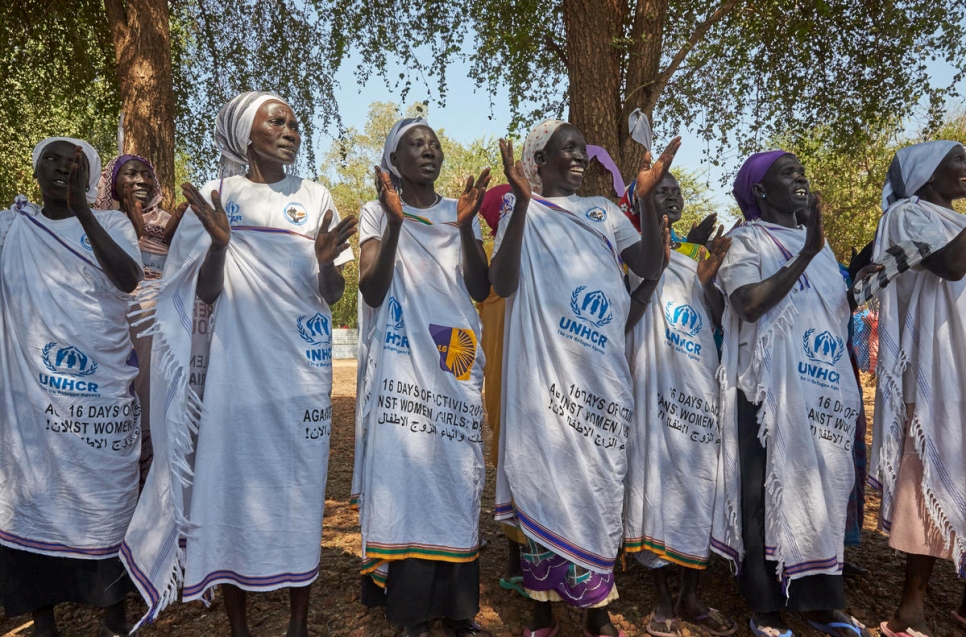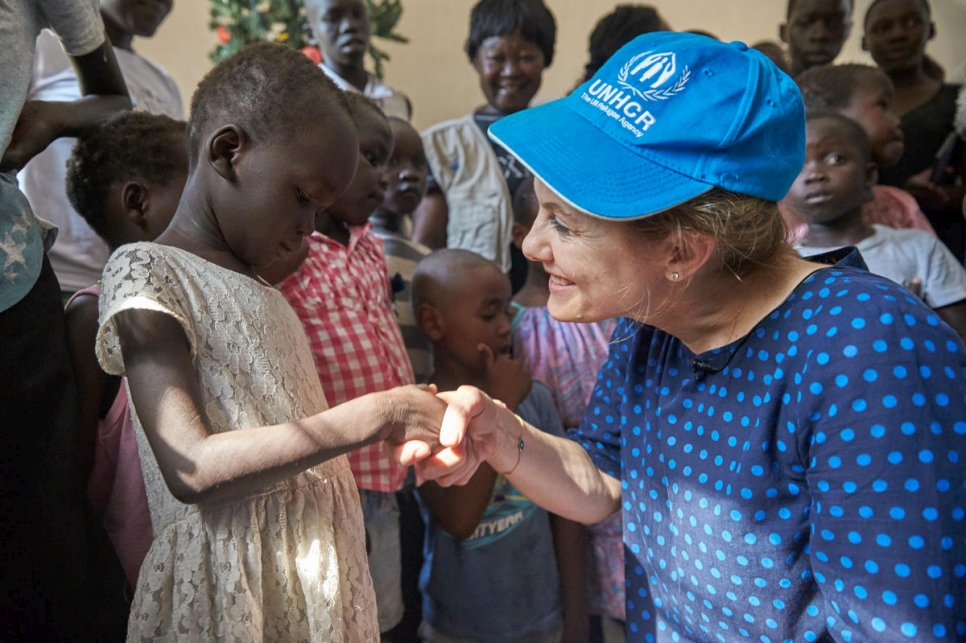Princess Sarah Zeid raises her voice for women and girls in South Sudan
Internally displaced and refugees share feelings of frustration and hopelessness with Princess during her visit to the conflict country
Princess Sarah Zeid is greeted by women at the Maban refugee camp.
© UNHCR/Jan Møller Hansen
JUBA, South Sudan – Princess Sarah Zeid of Jordan has completed her two-day visit to South Sudan where she witnessed firsthand the complexity and scale of the South Sudan crisis and met internally displaced people who shared their experiences with her.
“Everywhere we went, people were pleading for peace, for the opportunity to go back home and restart their normal life,” Princess Sarah said. “I am truly humbled by the stories I have heard, the stories of enormous courage, resilience and perseverance.”
Princess Sarah, in her capacity as the UNHCR Advisor on Gender, Forced Displacement and Protection, was in South Sudan to raise awareness of the situation. She visited several refugee camps and a site for internally displaced people – the Protection of Civilians site 3 - in Juba and Maban.
“I am truly humbled by the stories I have heard, the stories of enormous courage, resilience and perseverance.”
“Humanitarian organizations are trying hard to provide assistance to us but we don’t see any solution which would give us hope,” said one of the community leaders at the site who spoke to Princess Sarah. “We want peace so that we can go back to our homes and feel safe.”
Princess Sarah also met refugees and internally displaced women and girls, some who have been victims of gender based violence, in Doro camp. Her visit coincided with activities to mark the '16 days of Activism'. Amude* who fled to South Sudan from the Democratic Republic of Congo in 2011 was among the women that the Princess met at a women’s centre. Here, the women and girls seek assistance and protection and engage in various income generating activities like baking, tailoring and gardening.
“I was particularly impressed by the women’s center and community-driven initiatives to protect women and girls who have experienced violence,” said Princess Sarah. She commended the refugee women who offer their shelters as a safe place to other women and identified their gesture as an example of how communities can mobilize themselves and work together to respond to cases of sexual and gender-based violence.
“Women and girls are at the heart of the health and wellbeing of their children, family and community.”
“Women and girls are at the heart of the health and wellbeing of their children, family and community,” she added as she addressed the women and other refugees who welcomed her in Doro. “If a woman’s specific needs and protection are met, she is empowered and supported and her children, family and community will thrive. Women are a powerhouse of good!”
Doro refugee camp, which is about 500 km from Juba in the former Upper Nile State of South Sudan, was opened in November 2011 and is home to approximately 58,000 refugees mostly from Sudan.
“The Princess’ visit and her warm words to the women she met mean a lot to each of them,” said Helen Murshali, the director of the Centre. “It gives them a sense of hope that if someone as important as she can raise her voice in their support and protection, then that voice will certainly be heard."
While in the camp, Princess Sarah also witnessed how UNHCR and its partners work to promote peaceful co-existence between the refugee and host communities.
“The Princess’ visit and her warm words to the women she met mean a lot to each of them.”
“In the past there were problems between refugees and host communities due to scarcity of resources, lack of services and limited opportunities,” explained Johanne Siffointe, UNHCR’s Representative in South Sudan. He noted that progress had since been made and that all services are equally available to refugees and the host community.
Princess Sarah applauded these efforts and noted that she had witnessed how shared services were bringing the two communities together.
“It is great to see women in the newborn ward, sitting side by side nursing their babies, young people playing volleyball together, building team spirit and friendships between communities,” she said. “This is what I believe can really ease tensions between the two communities in times when resources are dwindling and both communities struggle to survive.
Princess Sarah’s visit was an important contribution to refocusing the attention of the international community on the South Sudan situation and the plight of displaced people within and outside the country.
“Without them [the women, children and youth of South Sudan]...there can be no sustainable peace.”
“We must not forget that every crisis is important and every life is important and as the international community, we have an obligation to do everything we can to protect and empower the women, children and youth of South Sudan – without them there can be no sustainable peace,” she emphasized.
As part of her mission to the region, Princess Sarah also visited Kenya’s Kakuma refugee camp which hosts over 77,000 South Sudanese refugees.
*Name changed for protection reasons




